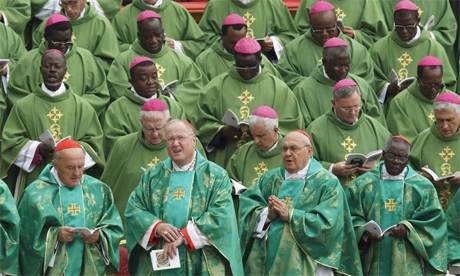On Oct. 6, 262 bishops gathered in Rome for the 13th Ordinary General Assembly of the Synod of Bishops to discuss “The New Evangelization for the Transmission of the Christian Faith.” One of the gathering’s primary concerns, particularly for those leaders of churches in the prosperous North, is how to reach out to disaffected Catholics.
That same day, half a world away in Bethesda, Md., researchers for the Pew Forum on Religion and Public Life were telling a gathering of religion writers that two new markers had been reached in the religion landscape in the United States: For the first time since the organization had begun surveying about such matters, the country was no longer majority Protestant, and one in five American adults now claimed no religious affiliation.
Though Catholicism showed no significant drop in overall membership — thanks in large part to the influx of immigrants — we also know that Catholics in the United States have been exiting the church in recent years by the millions, the younger ones before they reach age 18.
For years now “the new evangelization” has been lurking about in search of its own identity, more aspirant than actual in its determination to be relevant and “new.” The awkwardness that surrounds discussion of the elusive term was captured in a wire service story depicting the setting and content of the synod’s opening address, delivered by Cardinal Donald Wuerl of Washington.
The church must reach out to former members, showing them both the relevance of the faith “without losing its rootedness in the great living faith tradition of the church,” Wuerl said. He was speaking in Latin to a gathering of celibate male clerics. He lamented that too many Catholics don’t know basic prayers and teachings and don’t understand why it’s important to go to Mass and confession. His solution: reach out to them and teach them the contents of the Catechism of the Catholic Church.
Perhaps that’s a plan. But it sounds, instead, as if the analysis and proposed solution are as lifeless and lacking in blood and imagination as the church from which so many are exiting. The new evangelization will remain a stilted and cerebral exercise unless those most invested in its success are willing to take risks. Continue reading
